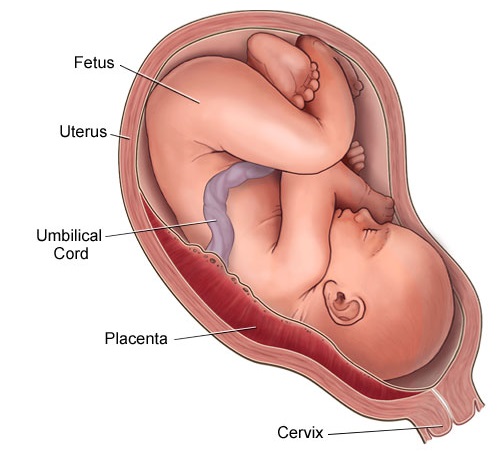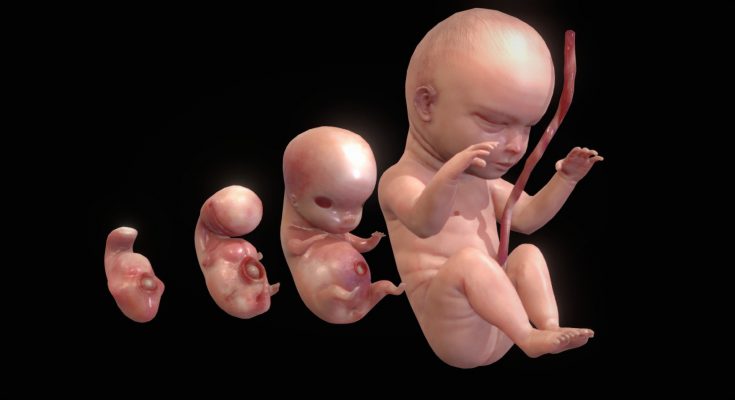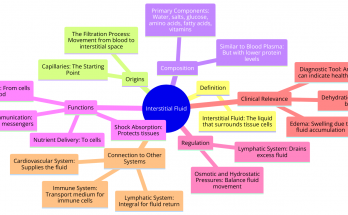The embryo gets nourishment from the mother’s blood with the help of a special tissue called the Placenta.
The Placenta provides an intimate connection between the fetal membranes and uterine wall permitting the diffusion of nourishment from the mother’s blood to that of the growing fetus and the disposal of wastes from the blood of the fetus to that of the mother.
In the early stages of gestation the implanted blastocyst (mass of cells) develops extra-embryonic membranes to protect and nourish the developing embryo.

Placenta
- The Placenta is a disc-like tissue that develops between the uterine wall and embryo.
- It contains villi on the side of the embryo and blood vessels surrounding the villi on the mother’s side.
- The Fetus receives glucose, amino acids, lipids, vitamins, mineral ions and oxygen from the mother’s blood through the placenta.
- Waste removal such as carbon dioxide and urea also takes place in the mother’s blood through the placenta.
- The blood vessels of the placenta are arranged in a way that allows for efficient exchange of gases and nutrients between the mother and the developing fetus. Oxygen and nutrients pass from the mother’s blood through the placenta and into the fetal blood vessels. Carbon dioxide and waste products pass from the fetal blood vessels through the placenta and into the mother’s bloodstream for removal.
- The placenta is formed by cells that originated from the fetus and is the first of the fetal organs to develop.
- In addition to its nutrient exchange function the placenta produces several important hormones during pregnancy such as human chorionic gonadotropin (hCG). HCG is responsible for maintaining the pregnancy and stimulating the production of progesterone and estrogen. These hormones help to prepare the mother’s body for pregnancy and promote the growth and development of the fetus.
- The placenta also plays a crucial role in fetal immune function. It produces immunoglobulin G (IgG) antibodies that can cross the placenta and provide passive immunity to the fetus against certain infections.
Also Check – 9 Important Functions of Placenta
Umbilical cord:
- A cord containing blood vessels connects the placenta with the fetus is called the Umbilical Cord.
- The fetal blood brought to it by an artery contains carbon dioxide and urea excreted by the fetus.
- This blood flows through very fine capillaries of the Placenta. Close to these are the capillaries and blood sinuses of the mother.
Also Check – How do Organisms Reproduce ?
Also Check – How do Organisms Reproduce Class 10 Question Answers
Materials that can pass from mother to fetus for utilization
- Oxygen- The placenta allows oxygen from the mother’s blood to diffuse into the fetal blood. This oxygen is essential for the development and growth of the fetus.
- Glucose- Glucose is a type of sugar that is used by the fetus as a source of energy. It is transported from the mother’s blood to the fetal blood through the placenta.
- Amino acids- Amino acids are the building blocks of proteins. They are transported from the mother’s blood to the fetal blood through the placenta and are used by the fetus to build its own proteins.
- Lipids – Lipids including fatty acids and glycerol are essential for fetal development. They are transported from the mother’s blood to the fetal blood through the placenta.
- Vitamins – Vitamins are important for fetal development and growth. Some vitamins such as vitamin D and vitamin K are transported from the mother’s blood to the fetal blood through the placenta.
- Mineral ions – Mineral ions such as sodium (Na), potassium (K), calcium (Ca) and chloride (Cl) are transported from the mother’s blood to the fetal blood through the placenta. These ions are important for the development of the fetal nervous system and other organs.
- Certain drugs – Some drugs can pass through the placenta and affect fetal development. This is why pregnant women are advised to avoid certain medications.
- Alcohol and nicotine – Alcohol and nicotine can also pass through the placenta and harm fetal development. Pregnant women are advised to avoid alcohol and smoking.
- Antibodies – Antibodies are proteins that are produced by the mother’s immune system. They can pass through the placenta and provide the fetus with immunity to certain diseases.
- Viruses- Some viruses such as HIV, can pass through the placenta and infect the fetus.
Materials that can pass from fetus to mother for elimination
- Carbon dioxide – Carbon dioxide is a waste product that is produced by the fetus. It is transported from the fetal blood to the mother’s blood through the placenta and eliminated by the mother’s respiratory system.
- Urea – Urea is a waste product that is produced by the fetus. It is transported from the fetal blood to the mother’s blood through the placenta and eliminated by the mother’s urinary system.
- Other waste products – Other waste products such as bilirubin and creatinine are also eliminated from the fetal blood to the mother’s blood through the placenta.
Also Check – Female Reproductive System


3 Comments on “How does the Embryo get Nourishment Inside the Mother’s Body”